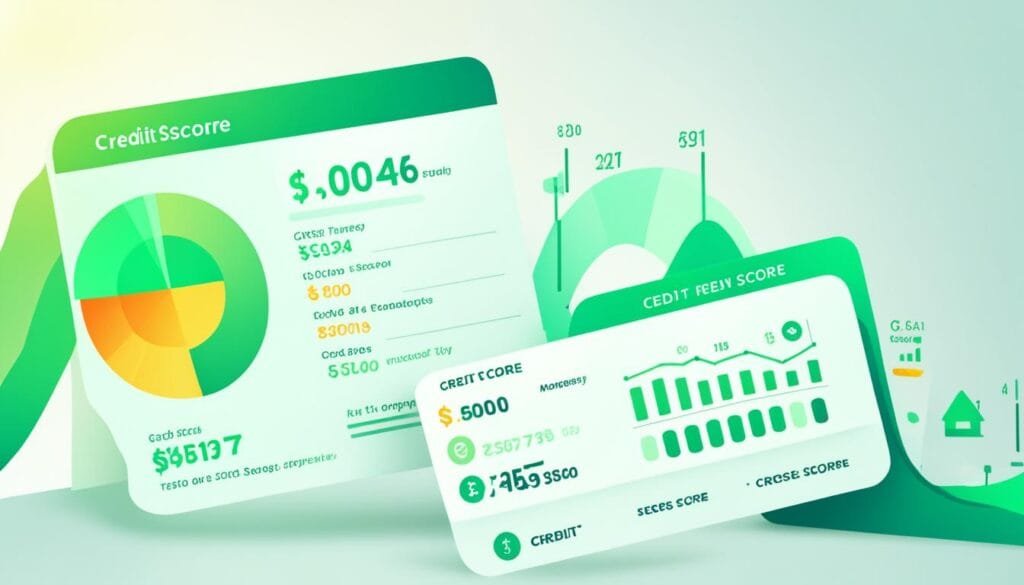When it comes to managing your credit, understanding the impact of inquiries is crucial. Inquiries occur when lenders request your credit report, either as a result of your application for new credit or other business inquiries. These inquiries can have both short-term and long-term effects on your credit score and overall financial health.
There are two types of inquiries: soft inquiries and hard inquiries. Soft inquiries, such as checking your own credit report or pre-qualified offers, do not have any negative impact on your credit score. On the other hand, hard inquiries occur when you actively apply for new credit, such as credit cards, loans, or mortgages.
Hard inquiries can potentially lower your credit score, especially if you have multiple inquiries within a short period of time. However, it’s important to note that not all hard inquiries have the same impact on your credit score. Inquiries related to auto, mortgage, or student loans made within a specific timeframe are usually treated as a single inquiry, minimizing their impact on your score.
It’s also important to understand that inquiries don’t stay on your credit report indefinitely. They typically remain on your report for two years, but their direct impact on your credit score usually lasts for one year or less. Practicing responsible credit behavior, such as making timely payments and keeping your credit utilization low, can help mitigate the negative effects of inquiries on your credit score.
Overall, while inquiries can have an impact on your credit score, they should not be a cause for major concern. By understanding how inquiries work and taking steps to minimize their impact, you can maintain a healthy credit profile and achieve your financial goals.
Key Takeaways:
- Inquiries occur when lenders request your credit report and can have a short-term and long-term impact on your credit score.
- There are two types of inquiries: soft inquiries and hard inquiries.
- Hard inquiries, especially multiple ones within a short period of time, can lower your credit score.
- Inquiries related to auto, mortgage, or student loans within a specific timeframe are usually treated as a single inquiry.
- Inquiries remain on your credit report for two years but only directly affect your credit score for up to a year.
- Practicing responsible credit behavior can help mitigate the negative effects of inquiries on your credit score.
How Hard Inquiries Affect your Credit Score
Hard inquiries can have a negative impact on your credit score, although the effect is typically minimal. Each hard inquiry has the potential to lower your FICO Scores by less than five points. However, the specific impact will vary based on your individual credit history.
It’s essential to understand that hard inquiries are just one factor among many that contribute to your credit score. Payment history and credit usage have a much more significant influence on your scores.
In some cases, multiple inquiries within a short period of time, such as when rate shopping for mortgages, auto loans, or student loans, are typically considered as a single inquiry. This means that you can compare rates without significantly affecting your credit scores.
“Hard inquiries can have a small impact on your credit score, but it’s important to focus on other factors that contribute to your overall credit health.”
Analysis and Impact of Inquiries
When it comes to the impact of inquiries on your credit score, it’s important to keep the following points in mind:
- Hard inquiries are considered in credit scoring models, but the specific impact can vary.
- Each hard inquiry typically has a minor effect on your credit score, lowering it by less than five points.
- Factors like payment history and credit utilization have a more significant impact on credit scores.
- Rate shopping for certain types of loans may be treated as a single inquiry, minimizing the potential impact.
| Factor | Impact on Credit Score |
|---|---|
| Hard Inquiries | Minor impact, less than five points |
| Payment History | Significant impact, timely payments are crucial |
| Credit Utilization | Notable impact, managing credit wisely is important |
As you can see, while hard inquiries do have an impact on your credit score, their significance should not be overstated. By focusing on maintaining a positive payment history and managing your credit utilization responsibly, you can mitigate any potential negative effects of inquiries on your credit score.
How Long Hard Inquiries Stay on Your Credit Report
Hard inquiries can have a lasting presence on your credit report, remaining visible for a period of two years. However, their direct impact on your credit score is typically limited to a duration of one year or less. While the presence of hard inquiries can potentially result in a temporary decrease in your credit score, the overall impact is generally minimal.
It’s important to note that while lenders can view all inquiries made within the two-year period, these inquiries only directly influence your credit score for up to a year. This means that responsible credit behavior, including timely payments and responsible credit usage, can contribute to the recovery from any negative effects caused by hard inquiries.
To minimize the impact of hard inquiries, it is advisable to plan your credit applications carefully and avoid unnecessary inquiries. By being strategic in your credit-seeking activities, you can maintain a healthy credit profile and enhance your overall financial standing.
Recovery from Hard Inquiries
Although the presence of hard inquiries can potentially impact your credit score, there are steps you can take to recover effectively. Focus on the following practices:
- Maintain responsible credit behavior, including making timely payments and keeping credit utilization low.
- Regularly monitor your credit report to ensure accuracy, identify potential errors, and detect any unauthorized inquiries.
- Avoid unnecessary credit applications and only apply for credit when it is truly needed.
By implementing these strategies, you can minimize the impact of hard inquiries and maintain a positive credit history.
In summary, hard inquiries remain on your credit report for two years, but their direct impact on your credit score usually lasts for one year or less. By practicing responsible credit behavior and being mindful of unnecessary credit applications, you can mitigate the potential negative effects of hard inquiries and ensure the long-term health of your credit profile.
Tips for Minimizing the Impact of Inquiries
To minimize the impact of inquiries on your credit score, it’s important to plan your credit applications strategically and only apply for the credit you truly need. By being mindful of your credit inquiries, you can maintain a healthy credit profile and improve your business’s overall performance.
Anticipate Major Credit Products
If you anticipate applying for a major credit product, such as a mortgage or a business loan, in the near future, it’s advisable to avoid applying for other new credit simultaneously. This will help you maintain a higher credit score and reduce the impact of multiple inquiries on your credit report. Planning ahead and focusing on essential credit applications can have a positive impact on your creditworthiness and business performance.
Regularly Monitor Your Credit Score
Monitoring your credit score regularly allows you to keep track of any changes resulting from inquiries. By staying informed about the impact of credit inquiries, you can make informed decisions and take appropriate measures to minimize any negative effects. Several online platforms offer credit monitoring services that provide real-time updates on your credit score, enabling you to proactively manage your credit health.
Review Your Credit Report
Checking your credit report regularly is essential to ensure that all inquiries listed are accurate and valid. It also helps you identify any potential cases of identity theft or erroneous reporting. By reviewing your credit report, you can promptly address any inaccuracies and maintain an accurate representation of your credit history, which can positively influence inquiries and business performance.
“Regularly monitoring your credit score and reviewing your credit report can help you minimize the impact of inquiries, protect your creditworthiness, and significantly improve your business’s overall performance.”

| Benefits of Minimizing the Impact of Inquiries | Impact on Business Performance |
|---|---|
| Higher credit score | Enhanced credibility and trustworthiness |
| Lower credit risk | Improved chances of securing favorable business loans and credit terms |
| Reduced potential for credit denials | Increased opportunities for business growth and expansion |
How Does Credit Freezing Affect Credit Inquiries?
When a credit freeze process explained properly, it can have a significant impact on credit inquiries. By placing a credit freeze on your account, potential lenders will not be able to access your credit report, which can help prevent unauthorized inquiries and protect your credit from fraudulent activity.
Conclusion
Inquiries play a role in determining your credit score, but their impact should not be exaggerated. While hard inquiries can have a temporary and minor effect on your credit score, it is crucial to remember that they are just one piece of the puzzle. Factors like payment history and credit utilization have a more significant influence on your credit score. By being mindful of your credit applications and understanding how inquiries are treated for rate shopping purposes, you can navigate the credit-seeking process confidently.
Regularly monitoring your credit score and reviewing your credit report are valuable practices to maintain a healthy credit profile. By staying informed and taking proactive steps, you can mitigate any potential negative impact caused by inquiries. Remember that inquiries are a part of the credit evaluation process, but they do not solely determine your creditworthiness or financial health.
To ensure a positive credit experience, it is recommended to plan your credit applications carefully and only apply for credit that you genuinely need. By doing so, you can minimize the number of inquiries on your credit report and reduce any potential risks associated with multiple inquiries.
FAQ
What are the two types of credit inquiries?
The two types of credit inquiries are soft inquiries and hard inquiries.
Do soft inquiries impact my credit score?
No, soft inquiries, such as checking your own credit report, do not affect your credit score.
How do hard inquiries impact my credit score?
Hard inquiries, which occur when you actively apply for new credit, can potentially lower your credit score.
Do all hard inquiries impact my credit score?
No, only hard inquiries from applications for new credit are considered in your credit scores.
How long do inquiries stay on my credit report?
Inquiries remain on your credit report for two years, but FICO Scores only consider inquiries from the last 12 months.
Can multiple inquiries within a short period of time affect my credit score?
Yes, multiple inquiries within a short period of time can indicate higher credit risk and potentially lower your credit score.
Are all types of inquiries treated the same?
Certain types of inquiries, such as those for auto, mortgage, or student loans within a short period of time, are typically treated as a single inquiry and have little impact on your credit scores.
How much can a hard inquiry lower my credit score?
Each hard inquiry can potentially lower your FICO Scores by less than five points, but the specific impact varies based on individual credit history.
How long does the impact of a hard inquiry last?
The direct impact of a hard inquiry on your credit score usually lasts for one year or less.
What factors have a larger impact on my credit score than inquiries?
Factors such as payment history and credit usage have a much larger impact on your credit score than inquiries.
Can I shop around for the best loan rates without affecting my credit score?
Yes, for certain types of loans, like mortgages, auto loans, or student loans, multiple inquiries within a short period of time are typically counted as one inquiry.
How can I minimize the impact of inquiries on my credit score?
It’s advisable to plan your credit applications, only apply for the credit you truly need, and avoid unnecessary inquiries.
What should I do if I suspect inaccurate inquiries on my credit report?
Regularly monitoring your credit score and reviewing your credit report can help you ensure the accuracy of listed inquiries and identify any potential identity theft or erroneous reporting.
Should I be overly concerned about the impact of inquiries on my credit score?
While inquiries can lower your credit score, their impact is usually small and temporary. Other factors, such as payment history and credit usage, have a more significant impact on your credit score.

